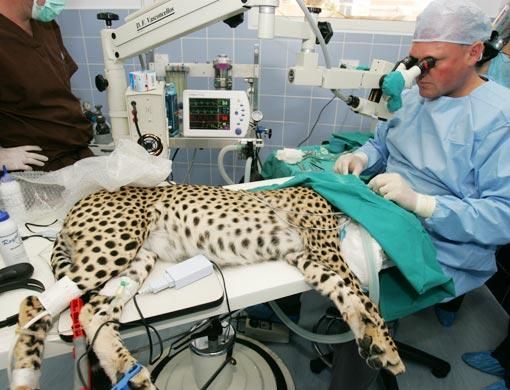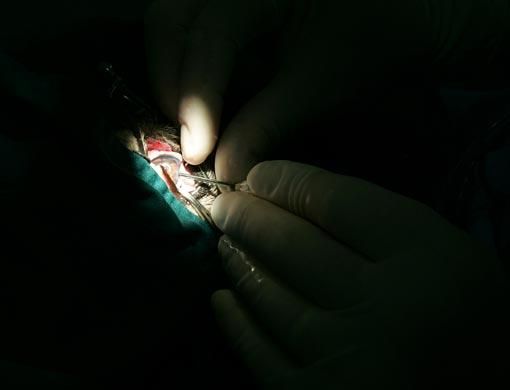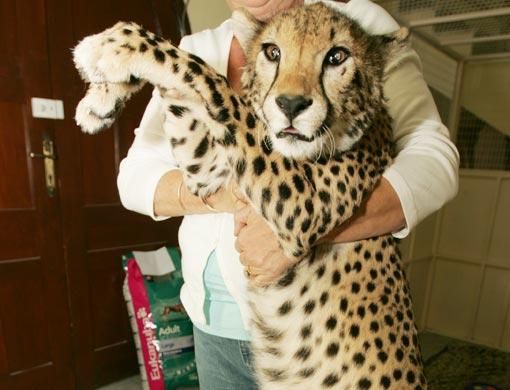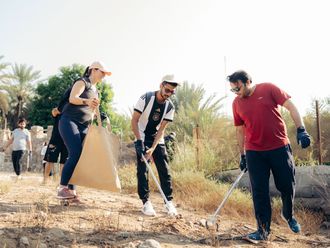Abu Dhabi: A striking and playful young feline was given a chance to a better quality of life on Sunday, when her eyesight was restored by doctors in Abu Dhabi.
Bee, a nine-month-old cheetah, became the first ever animal to undergo this kind of surgery in the Gulf region.
Understandably a little nervous, Bee received treatment for congenital cataracts in both her eyes at the British Veterinary Clinic (BVC) in Abu Dhabi, under the supervision of Dr Jonathan Hale, veterinary surgeon at the BVC, and South African veterinary ophtalmologist Dr Izak Venter, who was especially flown in for the surgery.
"Bee has been blind since she was a cub, but sometimes she gives the impression that she can see because her other senses are so developed," explained Dr Hale.
"Cataract is a condition that is recognised in cheetahs, and it might have something to do with the weaning process, during which animals don't always get a proper diet. Maybe she didn't develop a proper lens due to poor nutrition; we're always learning about what they need."
Dr Hale and Dr Venter used a technique called phaco-emulsification. "We removed the cloudy lens," said Dr Venter.
"The complication with this surgery is that the lens was a lot harder to remove because the cataract has been present since birth. We weren't able to implant an artificial lens yet, but we have restored Bee's vision. The detection of light happens in the back of the eye, so there is no need for the lens."
Bee was on the operating table for a total of two-and-a-half hours under general anaesthesia, and now has dissolvable stitches in her eyes.
According to the veterinarians, she will be able to detect light and darkness immediately, and they will be able to tell how she is adapting within a week to 10 days.
"We reversed the condition completely, so the brain needs to adjust," added Dr Venter.
"Even though there will be a dramatic change with her vision being restored, Bee will recognise humans by smell, so she won't be dangerous to humans. We might see a personality change, but it won't be dangerous."
Expert speak
Dr Jonathan Hale and Dr Izak Venter told Gulf News that cheetahs are friendly and reliable animals that can make great pets.
"They are not like lions or tigers at all; their personalities are very different, and they are very comfortable with people."
While anyone can own a cheetah, the veterinarians say not everyone should.
"There is no need for a licence to own a cheetah as long as it has been bred in captivity. But you need to have a certain amount of property so that the pet can run around and get some exercise."
Procedure
The surgeon first makes a small incision at the edge of the cornea and then creates an opening in the membrane that surrounds the cataractous lens.
This thin membrane is called the capsule.
A small ultrasonic probe is inserted through the opening in the cornea and capsule. The probe's vibrating tip breaks up or "emulsifies" the cloudy lens into tiny fragments that are suctioned out of the capsule by an attachment on the probe tip.
After the lens is completely removed, the probe is withdrawn leaving only the clear bag-like capsule. Then an artificial intraocular lens is implanted.
Your comments
After reading about the cataract operation for the cheetah I realise that still there is the quality of being humane; kindness; benevolence there in the UAE.
S.A. Ahmed
Addison,USA













